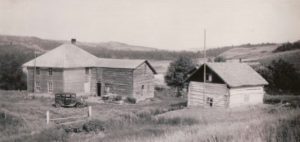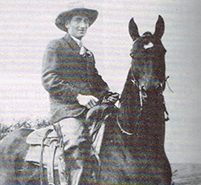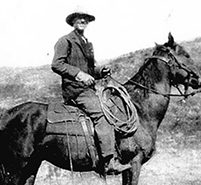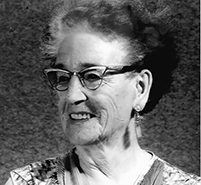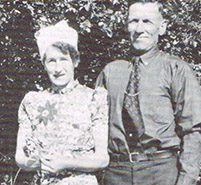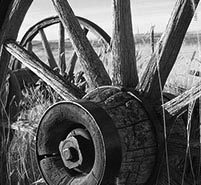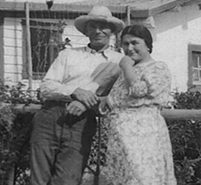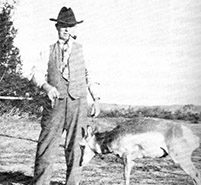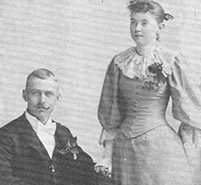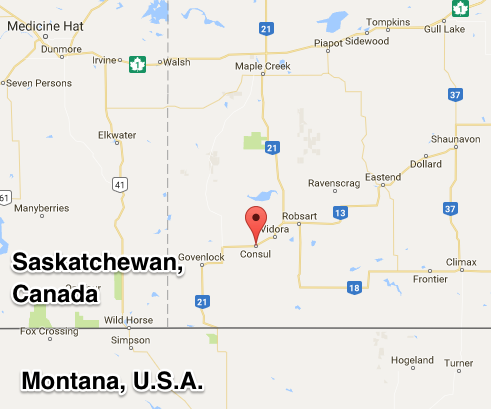Wood and Anderson Ranch
Source: Mrs. Evelyn Wood in Merryflat and District history book
I do not know the exact date when [David] Wood and [Wellington] Anderson moved to Saskatchewan. The two men formed a partnership in Manitoba and after locating a ranch on the site of old Fort Walsh drove all their stock from Manitoba to the site they had chosen. The journey took nearly two months of a lovely summer and as they had every necessity with them for comfortable camping they thoroughly enjoyed the experience.
Their first house was built of logs and consisted of one room below and another above as sleeping quarters; it also had an adjoining shed. This served their needs for several years, but finally was replaced by a much larger house which afforded space for their requirements. It was built of logs and sided up with boards. It was painted on the outside and well plastered on the inside which made it very comfortable. The old house served as a bunk house for the men.
The country around soon began to be settled by ranchers, but Wood and Anderson were the first settlers on Battle Creek. [1884 or 1885]
In the early years Fort Walsh was the headquarters of the Mounted Police so all roads led into it and all distances were measured from it as a centre. For example the Ten Mile Detachment was ten miles from Fort Walsh.
Also, for years it was the only road into Maple Creek so most travellers made it their stopping place on the way in and out. Everyone received free entertainment and a warm welcome from the bachelors Wood and Anderson.
Little by little they built up their stock and equipment and acquired more land, but it took very hard work through the early years. I remember hearing Mr. Wood say that at first they never went to Maple Creek unless absolutely necessary and often when they did they took blankets and feed for their horses and slept in the wagon on the outskirts of the town to save the price of a night’s lodging.
In 1908 Mr. Wood and I were married. Shortly afterward Mr. Anderson married Miss Annie Gilchrist. We occupied the same house until Mr. Anderson passed away not many months after his marriage and after a long partnership never broke over twenty five years. Mrs. Anderson remained at the ranch for some years and then left to make her home in the East.
Accustomed to town and city life it was a very great change for me to live in the Hills and it took some time to become adjusted to the new life, but in time I became very interested in the stock and loved the beautiful surroundings of the ranch and very proud of its history.
There were some disadvantages connected with living at such a distance from Maple Creek. No school had yet been established, but as a qualified teacher I was able to instruct my children at home. There was no regular church service, but for some years students for the ministry were sent to the Hills for the holiday months and meetings were held in the houses. Dances were the only form of entertainment at that time and people came long distances in order to attend; consequently they were obliged to remain all night.
There were occasional picnics in the summer which were much enjoyed. Despite the long distances there was a great deal of visiting among the ranchers, particularly in the winter.
The Hills supplied a great variety of wild fruit and all ranchers salted quantities of beef to keep for summer use. In addition, contrary to the usual practice for ranchers, Wood and Anderson kept geese, turkeys, chickens, pigs and sheep which provided a good variety of food. Gardens grew quite well, but owing to late and early frosts it was impossible to grow any of the tender vegetables such as corn, cucumbers or tomatoes.
Houses then were not provided with the labor saving devices in use at the present time. All water had to be carried in and out of the house, also all fuel. But the men were very kind and thoughtful and spared us the heavier tasks as much as possible.
The principal work about the house was cooking and baking for an undetermined number of people. It was difficult for a newcomer to adjust to the constant changes in the number around her table. For the first fifteen months of my marriage I never sat down to one meal without outsiders to share it. It was difficult to know how much food to prepare in advance. I sometimes baked twelve large loaves of bread and two big pans of buns three times a week with hot biscuits in between and other food in proportion. But in time I became accustomed to it and took it as a matter of course. There had to be good food and plenty of it. As a rule I was fortunate in having good help. [Belle Parsonage was one person who worked there.]
My life in British Columbia is quite different in all respects and I expect it will be the last of my many experiences.
Added Note:
“There was a man working for the Trust Company called Frank Headesback; the ranch was owned by Mrs. E. Wood, but the Trust Company was running it for her… I can’t remember anyone every saying how long the Trust Company had the place.”1
“Jack and Maggie MacKinnon lived at (Wood and Anderson Ranch) Fort Walsh, Saskatchewan from 1926 to 1933”2
Frank Nuttall bought the Wood and Anderson Ranch in 1934.
“In 1942 Frank sold the Fort Walsh Ranch to the federal government. The ranch was purchased for raising remount horses for the RCMP.” 3
Fort Walsh is now a National Historic Site.
1 From Sage to Timber, Nuttall, Howard 134.
2 Graham, Jacqueline 115.
3 Nuttall, Joyce 130.

